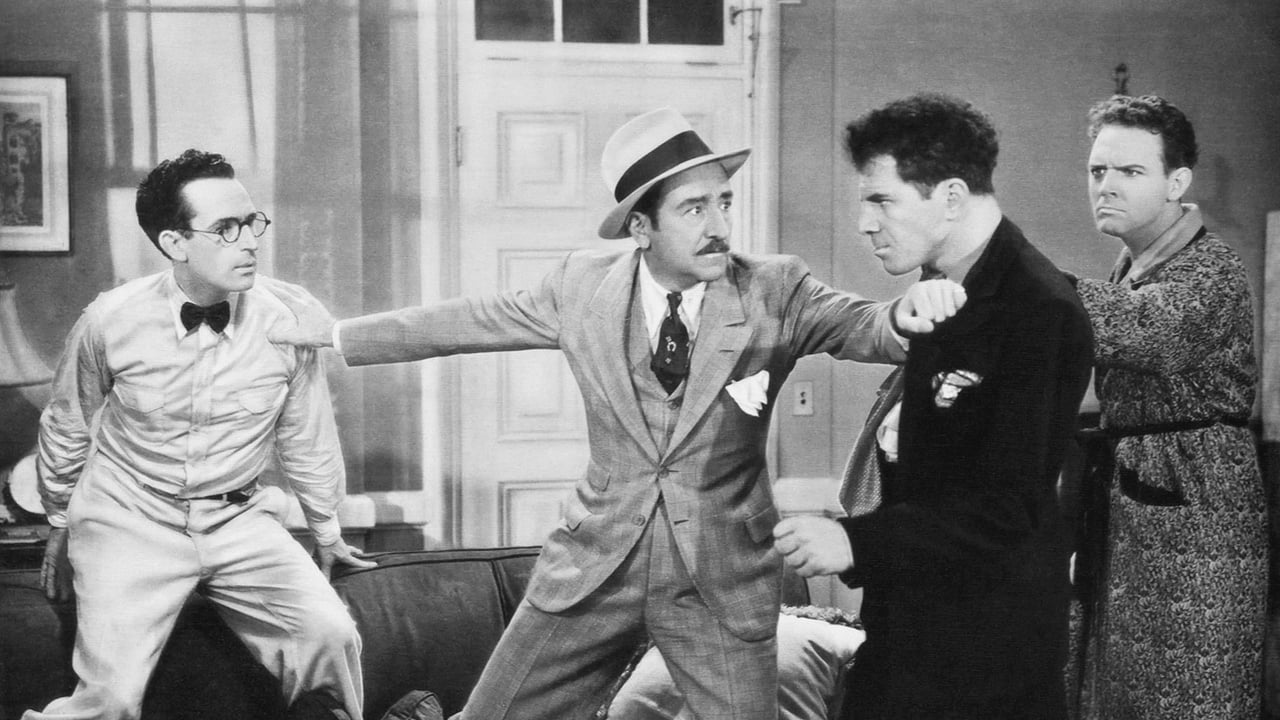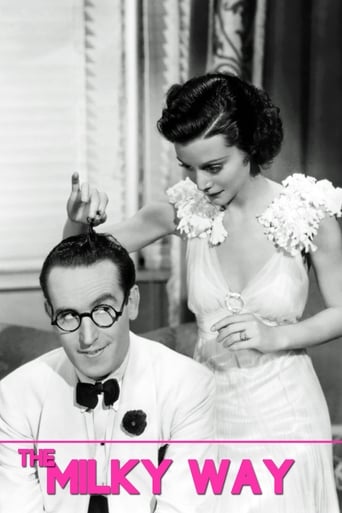



Really Surprised!
one of my absolute favorites!
The story, direction, characters, and writing/dialogue is akin to taking a tranquilizer shot to the neck, but everything else was so well done.
View MoreThe joyful confection is coated in a sparkly gloss, bright enough to gleam from the darkest, most cynical corners.
View MoreCopyright 11 February 1936 by Paramount Productions, Inc. New York opening at the Paramount: 25 March 1936. U.S. release: 7 February 1936. Australian release: 22 April 1936. 10 reels. 8,010 feet. 89 minutes.SYNOPSIS: The opening credits set a comic tone for the farce that follows: a cow in the Paramount logo à la MGM's lion! In the first scene the owner of the Sunshine Dairy is giving a pep talk to his milkmen and congratulating his better salesmen. Burleigh Sullivan (Lloyd) is passed over in the laudatory remarks. Not only is he apparently an underachiever, to the dismay of his boss, but in the middle of the lecture he gets the hiccups, distracts the proceedings and causes general mayhem. Later that evening his sister Mae (Helen Mack) is jockeying with some soused patrons as she operates the coat-check concession in a local hotel. They wait for her outside; when she leaves to go home, they detain her with childish pranks. Burleigh comes to her rescue and gets mixed up in a brawl — when the crowd clears it seems he has knocked out the middleweight boxing champion!NOTES: The stage play opened on Broadway at the Cort on 8 May 1934. It ran a just mildly successful 63 performances. Produced by Harmon and Ullman, it was directed by William W. Schorr and starred Hugh O'Connell as Burleigh, Brian Donlevy as Speed, Leo Donnelly as Gaby, and Gladys George as Ann.The 1940 radio adaptation of The Milky Way on Texaco Star Theatre featured Joe E. Brown in the role of Burleigh Sullivan.The 1946 film remake, The Kid from Brooklyn, was produced by Samuel Goldwyn, distributed by RKO, and directed in Technicolor by Norman Z. McLeod. It featured Danny Kaye as Burleigh, Virginia Mayo as Polly, Vera-Ellen as Susie Sullivan ("Mae" in original), Walter Abel as Gabby, Eve Arden as Ann, Steve Cochran as Speed, Lionel Stander repeating his original role as Spider, Fay Bainter as Mrs LeMoyne, Pierre Watkin as Mr. LeMoyne, and Clarence Kolb as Wilbur Austin.COMMENT: If ever there was a typical Friday flick "The Milky Way" is it. An "A" feature from a major studio with all the publicity, pizazz and highly enthusiastic reviews that such an offering can generate, yet starring a once-super=popular silent comedian who had made a none-too-successful transition to sound. Even worse from the showman's angle, Lloyd was not only billed as the only above-the- title star, but in letters twice as thick and twice as big as the Milky Way title itself. So you were forced to sell the film with a name star that many of your potential patrons had already written off. Moreover, your own opinion of the film — an opinion re-inforced by talking to other exhibitors at the Paramount trade screening — was that it wasn't half as funny as the critics opined. True, the pace was fast and frantic enough, and some of the knockabout stuff was pretty amusing, but there seemed a lot of forced shouting and screaming, often to little effect, while many of the occasional wisecracks were either inaudibly thrown away or too sophisticated for your audience.Lloyd's problem, like that of the other great silent comedians, was that the screen persona he had built up was simply too simplistic for sound. And whereas the silent comedian could hold a feature together on his own, with the support players being just that — a support — this was not generally the case with sound. A further distraction was that the comic's voice was often at odds with his image. Chaplin's aristocratic English would have sounded way out of place in the mouth of the Little Tramp.With the notable exception of Langdon (who was actually the same guileless innocent in real life as he was in films), just about all the major silent stars realized these pitfalls, but Chaplin alone succeeded in wholly overcoming them. This he did by creating an entirely new screen personality and by surrounding himself with players who had plenty of charisma in their own right. Lloyd has attempted both these stratagems here, but his success is limited. He still tends to hog the camera to an irritating degree. True, this is great in those scenes where he's supposed to be obnoxious, and also good when he demonstrates his nimble footwork. But when he speaks (which is too often too long) he loses our interest because his voice is too monotonous, too ordinary, it lacks timbre.Of the support players, only Veree Teasdale and Lionel Stander really shine, though Barbier makes the most of his opportunities and Dorothy Wilson is pretty enough as the hot/cold Polly. But Menjou comes on too strong with weak material and Gargan (pronounced "Garrigan") is almost a total write-off.Maybe I'm prejudiced because I saw it first (and often), but I think "The Kid from Brooklyn" is much more entertaining — particularly in those scenes re-stated word for word or blow for blow. The bits I liked best about this Milky Way were the bits of business not used by the Kid, like Lloyd's boomerang hat and all the stuff with the foal in the taxi. With the exception of Walter Abel, the players in Kid are noticeably superior to Milky. Even Lionel Stander excels his own very self. The same goes for the production. In the Goldwyn versus Zukor contest, it's Goldwyn by a mile.
View More"The Milky Way" is one of the last films that Harold Lloyd made before retiring from acting. Along with Charlie Chaplin and Buster Keaton, Lloyd was one of the great legendary comics of the silent film era. He transitioned OK into sound pictures, but with sound the style of comedy changed from almost all antics to scripts with dialog and other movement. So, he retired early in the sound era. Keaton didn't have a nest egg built up so he continued to work steadily through the 1960s, first doing many shorts that were still used with features in theaters, and then in lesser and lesser roles of feature films. Chaplin was a prolific writer as well, and a successful director and producer. He had a nice nest egg built up, so he was able to live while working on an occasional hit film. Over the next two decades he made just four films, each one a masterpiece.This film is a simple plot with silly scenes of Lloyd's Burleigh Sullivan knocking out prizefighters. That is, supposedly knocking them out. A small supporting cast does a good job. Adolphe Menjou is a showstopper in his scenes. He comes on strong as Gabby Sloan, the questionable fight manager. Some supporting cast standards have nice parts. Lionel Stander is very funny as Spider Schultz. For anyone who hasn't seen Lloyd in a movie, this film is OK. But this doesn't rank anywhere near the classic stuff for which he is most remembered. He is the guy hanging high over a street from the hands of a large clock on a building. That 1923 film, "Safety Last," is among his classics.
View MoreOverall, this is entertaining even if it is very dated in a Harold Lloyd-kind of way, meaning a typical role for him where he's the wimpy-but -brave hero. In this story, Harold is "Burleigh Sullivan," the shy milkman who winds up - even though no clue about boxing - as a professional fighting for the middleweight championship of the world! Ridiculous? Yes, but that was Lloyd and his films: slapstick lunacy like Keaton, Chaplin, the Marx Brothers, etc.Along the way to his fame and glory in the ring, Harold picks up a serious girlfriend (the very wholesome and attractive Dorothy Wilson as "Polly Pringle") and so a little romance is part of the story.Lloyd provides a lot of laughs but he isn't the only one. Helen Mack has a lot of wisecracking lines as Burleigh's younger sister, "Mae." Also, con-man/fight manager "Honest Gabby Sloan" (Adolph Menjou) gets in his share of funny and serious lines. The three of them, plus some other mentally-deficient boxers, all contribute humor.In all, it's a sweet-tempered film with a lot of charm. True, some of the humor is too dated and stupid but the "hits" far outnumber the "misses" in the comedy department.
View MoreI was fortunate enough to catch this at a private screening as I understand there was an attempt to destroy all copies when the remake with Danny Kaye was made. I have seen both and this version is far superior. Harold Lloyd is incredibly funny and his comic timing has to be among the best. If you get a chance, catch this one. 8 out of 10.
View More